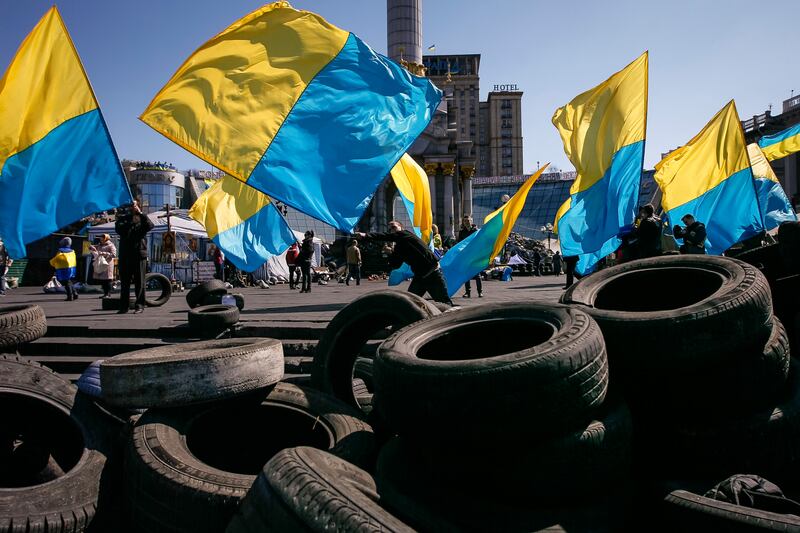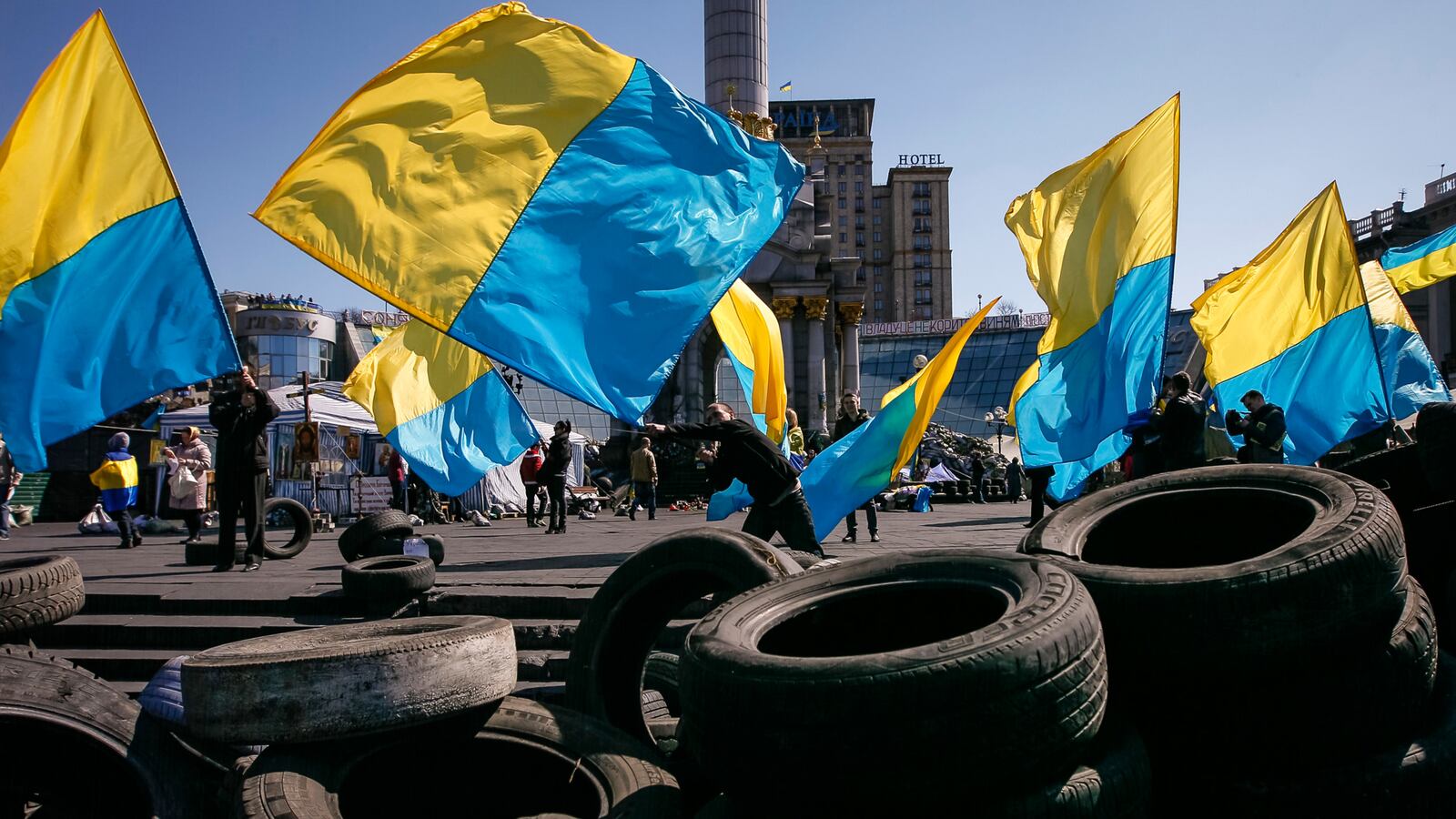KIEV, Ukraine — As he descended onto Kiev’s Maidan on Sunday, the popular German folk singer Wolf Biermann did not know what to expect.

“I was afraid that it was true what the propaganda tells,” said the short, cuddly Biermann. He feared that the Ukrainian revolution was indeed made up of “fascists” and “asocial idiots,” as much of the Russian and Western European media has been reporting. Since the overthrow of pro-Russian president Viktor Yanukovych in February, Moscow repeatedly has depicted the revolution that ousted him—composed of a broad cross-section of Ukrainian society—as the work of “neo-Nazis” and violent nationalists.
Thanks to the unrelenting repetition of this message in Russian-language media, many ethnic Russians throughout Ukraine believe that the new central government is indeed fascist, a perception that is contributing to violence and the seizure of government buildings in the country’s east.
Biermann knows something about propaganda, having been a victim of it himself. He was born in Hamburg in 1936 to a communist Jewish father who was later murdered at Auschwitz. In 1953, as thousands of people were leaving Soviet-occupied East Germany for the West, Biermann, a devoted young communist, went in the reverse direction, settling in the German Democratic Republic.
But over the years, through his subversive lyrics, Biermann subtly protested conditions in the GDR and angered authorities in the reigning Socialist Unity Party. He was expelled as a party member in 1963 and in 1965 blacklisted altogether, which prevented him from performing or selling records. At one point, the East German government offered him a coveted one-way visa out of the country, but so committed was Biermann to the cause of socialism that he refused to take it, hoping to change the GDR from within.
Then, in 1976, when Biermann was on a tour of West Germany, East Berlin promptly revoked his citizenship, leading to his expatriation. After the fall of the Berlin Wall in 1989 and German reunification, Biermann looked up his Stasi file, which he told me was 80,000 pages long. Today, he is one of the most celebrated cultural figures in Germany.
It’s not difficult to understand, then, how Ukrainians on the Maidan, fighting off the imperialism of a resurgent Russia, would find Biermann a source of inspiration. So honored were they to encounter Biermann that members of a self-defense unit on the square made him an honorary member and gave him a steel helmet, which, he jokingly told me, he’ll need upon his return to Germany so as to withstand the attacks from the country’s many Putin-Verstehers, or Putin-sympathizers, chief among them former Chancellor Gerhard Schroeder.
But while Biermann certainly lifted morale on the Maidan, the Maidan’s effect on Biermann was also palpable. “They are no fascists. They are normal, working-class people, with families and with children,” he told me. He even met some Russian-speaking Ukrainians from the country’s east, whose bravery in withstanding the opposition of many of their neighbors in order to venture to Kiev astounded him.
Biermann told me that the spirit of the protestors reminded him of an ode by the famous German poet Heinrich Heine, “Enfant Perdu,” which speaks to the Freiheitskrieg der Menschheit, or “Humanity’s war for freedom,” which, he said, is as old as when the “monkeys descended from the trees.”
So when Wolf Biermann says that, “the newest issue of this Freiheitskrieg is now on the Maidan,” it means that the battle for the future of Ukraine has massively important repercussions.
Biermann was one of over 100 artists, intellectuals, academics, journalists, and activists who visited Kiev last weekend to lend support for the Maidan under the auspices of a conference entitled, “Ukraine: Thinking Together.” Organized by Yale history professor Timothy Snyder, whose writing on Ukraine over the past six months has been essential reading for anyone concerned with understanding the country and its predicament, the conference aimed not only to show solidarity with a country under Russian attack, but to consider the manifold set of intellectual challenges presented by the Ukrainian revolution and counterrevolution.
The vast moral gulf existing between the spirit of the Maidan and the cynicism of the Kremlin, or, more precisely, the humanity of the Maidan and the inhumanity of the Kremlin, was encapsulated for me on Sunday morning. Before opening the first panel discussion, Snyder led conference participants in a moment of silence to commemorate the 70th anniversary of the deportation of the Crimean Tatars, the indigenous Muslim people who had populated that province, recently annexed by Russia, for centuries.
Under Josef Stalin, the Soviet Union deported some 200,000 Tatars to Uzbekistan, nearly half of whom died along the way. Snyder had invited Tatar scholars to attend the conference, but they chose to remain in Crimea so as to mark this occasion. Elsewhere in Kiev, Muslim, Christian and Jewish Ukrainians gathered to remember the tragedy. These gestures were stirring examples of Ukrainians acknowledging their common humanity in the face of blunt attacks to divide them, the sort of honest historical reckonings required of a nation to become modern and humane. It is precisely the sort of inclusiveness—not only thinking, but remembering, together—that is so visibly and sadly absent in Putin’s Russia, where the past is whitewashed for present-day political purposes.
In Crimea itself, the actual site of the Tatar deportations, the old-new Russian authorities banned public commemorations of the tragedy, a move Tatar leaders rightly denounced as “inhuman.” This petty and wounding act led people across Ukraine to label Sunday a “Day of Forbidden Sorrow.”
Defying the ban, thousands of Tatars gathered at a mosque on the outskirts of the Crimean capital of Simferopol in a demonstration the Russians tried to disrupt by buzzing helicopters closely over the proceedings. Watching video of the event, I could not help but recognize a similarity in the attempts by South Africa’s white minority regime to disrupt and disperse the funerals of murdered, black anti-apartheid activists, episodes that inevitably led to spiraling violence and greater, angrier crowds at subsequent politicized funerals.
Some might question the purpose of an intellectual confab when a country has just lost a significant portion of its territory to an aggressive neighbor and faces the ongoing ordeal of violent separatism instigated by said neighbor in its still-sovereign territory. Putin, after all, has one of the world’s biggest armies, can count influential allies across Europe, and boasts a massive nuclear arsenal. Ukraine is poor, corrupt, and divided. In light of these disparities, it is obvious that Ukraine needs more than the sentiments, however emphatically expressed or sincerely held, of intellectuals. It needs weaponry and supplies (which, as my colleague Eli Lake reported last week, have been shamefully slow in coming from Washington) and it needs practical diplomatic support.
But there is something inherently valuable in showing solidarity with a people under siege; both for those who are looking down the barrel of the Russian guns and for those of us who, after the gathering ends, can return to lives of safety and comfort in America and Western Europe.
Talking with and listening to colleagues from around the world, no matter what language they spoke, one felt a frisson of shared purpose in defending values—tolerance, pluralism, democracy, and individual dignity—which Putin has destroyed in his own country and hopes to destroy elsewhere.
Defeating Putinism requires a serious appraisal of its qualities, a task that requires hard intellectual work and camaraderie with link-minded individuals. Riffing on the Communist Manifesto, the great Polish dissident Adam Michnik slyly congratulated his Ukrainian colleagues when he declared that, “What’s haunting the halls of the Kremlin today is the specter of the Maidan.”
When I met Biermann at the bar of the Intercontinental Hotel on Sunday night, he was apologizing to Snyder for having missed the day’s agenda as he had decided to visit the Maidan instead. “For me, it was very important to come in touch with real human beings, and not just ideas about Ukraine,” he explained to us.
The previous evening, after a day full of conferencing, Biermann had attended a reception at the residence of the American ambassador, and he was feeling restless not having visited the nerve center of the revolution. The next day, once he entered the square, it was as if he had been transported back in time to one of his folk concerts protesting the lack of freedom in the GDR; at a makeshift kitchen, someone offered him bean soup. “To tell the truth, it wasn’t high society food,” Biermann said. “But for me it was better than the caviar at the home of the Ambassador of the United States.”





